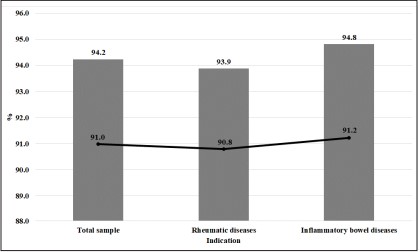HIGHLIGHTS
- Monoclonal antibodies have proven efficacy in the management of several conditions and infliximab (IFX) is one of the most important drugs of the class.
- The objective of this study was to describe adherence and persistence rate to IFX treatment and also persistence in the patient support program (PSP).
- We found that many patients leave the program without discontinuing IFX, since the 12-month persistence were very different between program and medication estimates, while high adherence rates were observed among patients enrolled in the PSP. Data highlights the benefits of a PSP.
ABSTRACT – Background –
Monoclonal antibodies have proven efficacy in the management of several conditions and infliximab (IFX) is one of the most important drugs of the class. Some recent data have shown low rates of both persistence and adherence to several available biologics. Objective – The objective of this study was to describe adherence and persistence rate to IFX treatment and also persistence in the patient support program (PSP), among patients diagnosed with inflammatory bowel diseases (IBD) or rheumatic diseases (RD) enrolled in the program of a large pharmaceutical company in Brazil. Methods – Retrospective observational analysis using the PSP database. IBD or RD patients using IFX enrolled on the PSP database between September 2015 and August 2019 were retrospectively evaluated to identify the persistence rate and adherence and followed up until March 1, 2020. Patients were excluded if treatment start date was prior to program entry; first infusion prior to September 1st, 2015 or after August 31st, 2019; the patients did not started treatment; and patients with “OTHERS” in “Indication” field. Persistence was assessed considering both persistence in the program (“PSP persistence”) and persistence on IFX in the PSP (“IFX persistence in the PSP”). PSP persistence was defined as the proportion of patients remaining in the program at 6, 12, 24, 36 and 48 months after initiating IFX. To determine IFX persistence in the PSP, censoring was defined at the time the patient left the program, died, or was lost to follow-up. Adherence to treatment was measured by medication possession ratio ((MPR) – All days supply / elapsed days from first prescription to last day of medication possession)). Descriptive statistics were initially used. Kaplan-Meier curve, the median time estimated by the survival function, Cox regression model, and restricted mean survival time (RMST) were used to evaluate the treatment persistence time at 24 months and the logistic regression model was performed aiming to identify variables associated with adherence (MPR ≥80%). Results – A total of 10,233 patients were analyzed, 5,826 (56.9%) with the diagnosis of RD and 4,407 (43.1%) of IBD. At the end of the follow-up (median 9.1 months from PSP entry to the last infusion), persistence in the PSP was 65.6%, 48.2%, 31.0%, 20.7% and 13.1% at 6, 12, 24, 36 and 48 months, respectively. Considering persistence on IFX in the PSP, estimates were 93.7%, 87.8%, 77.0%, 62.4% and 53.0% at 6, 12, 24, 36 and 48 months, respectively. Variables associated with the risk of non-persistence were gender, country region and diagnosis of rheumatoid arthritis and ankylosing spondylitis. Median MPR was 94.2%, while the percentage of patients with MPR ≥80% was 91.0%. Variables associated with MPR≥80% were country region and diagnosis of Crohn’s disease.
CONCLUSÃO
Many patients leave the program without discontinuing IFX, since the 12-month persistence were very different between program and medication estimates, while high adherence rates were observed among patients enrolled in the PSP. Data highlights the benefits of a PSP.
AUTORES
Aniela Bonorino Xexeo Castelo BRANCO1, Wilton ARGOLO1, Nathalia SANTOS1, Gabriela HERNANDEZ1, Adriana KAKEHASI2, Carlos Walter SOBRADO3 and Richard MELSHEIMER4


